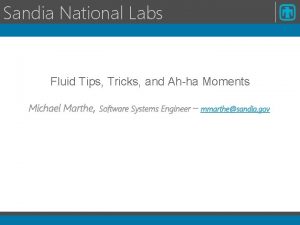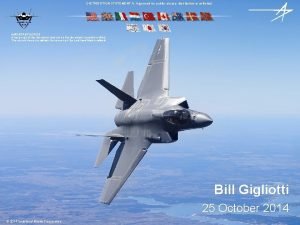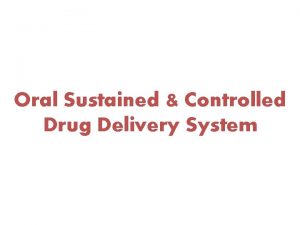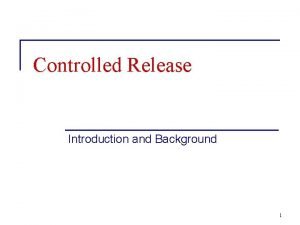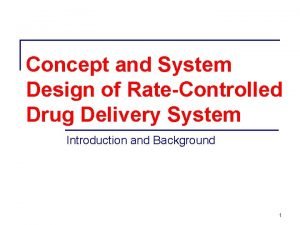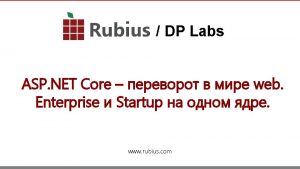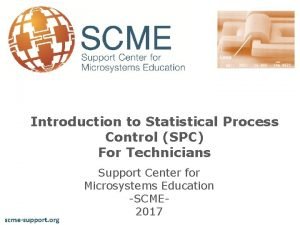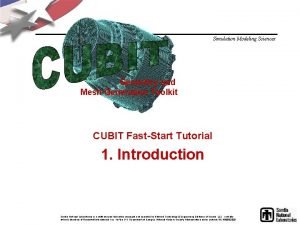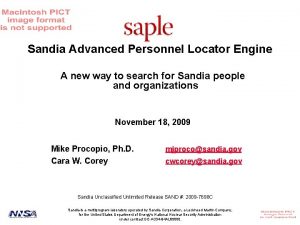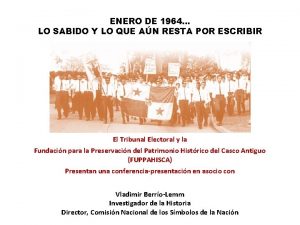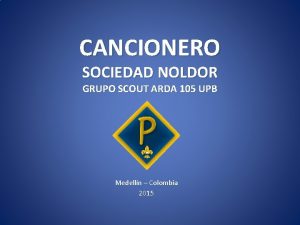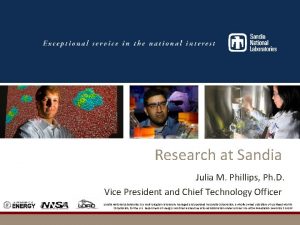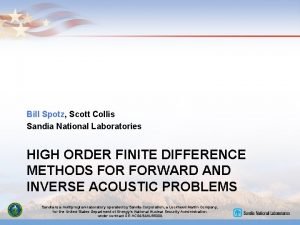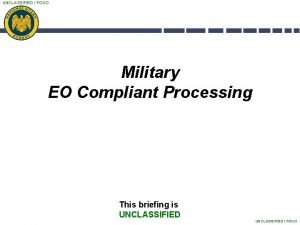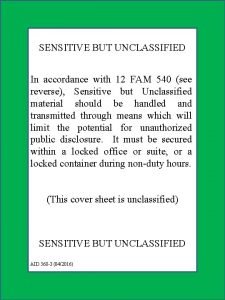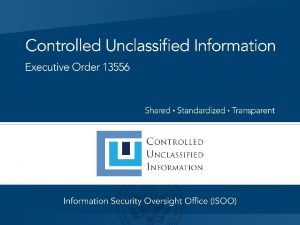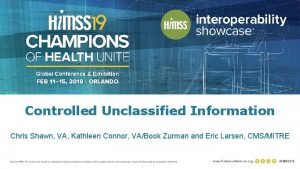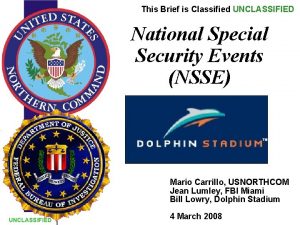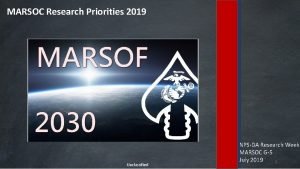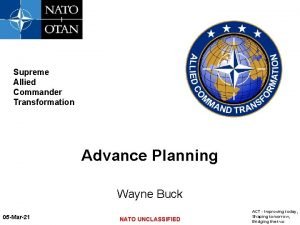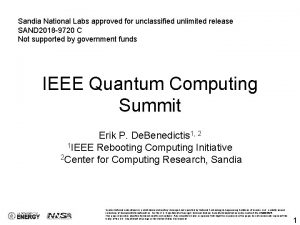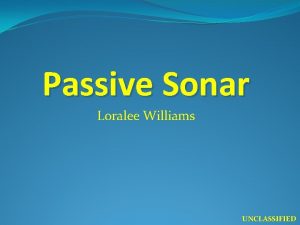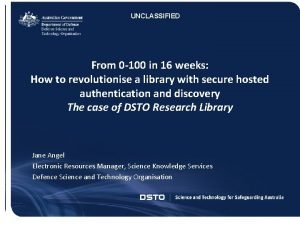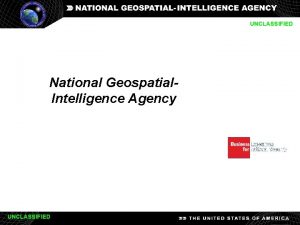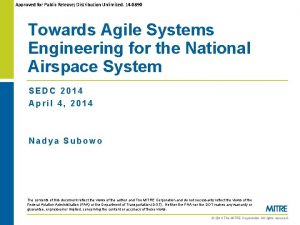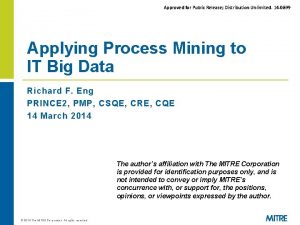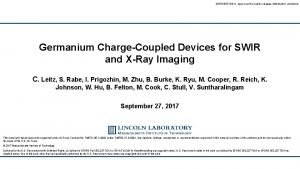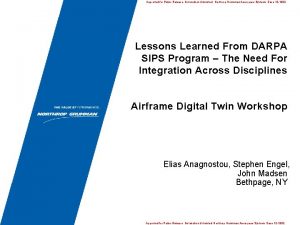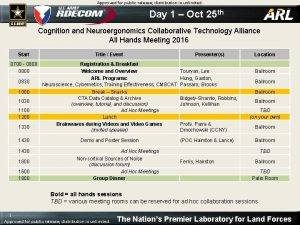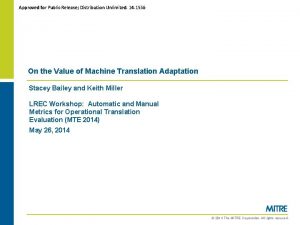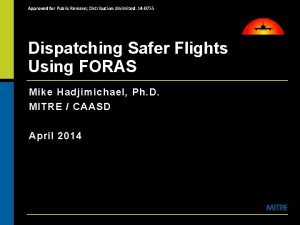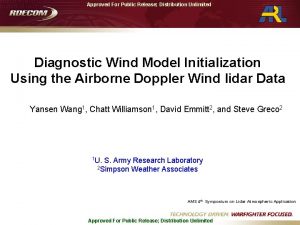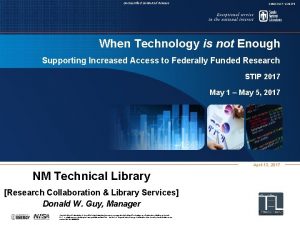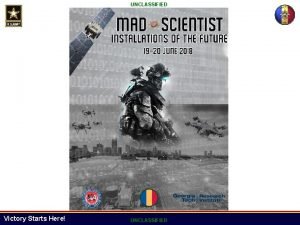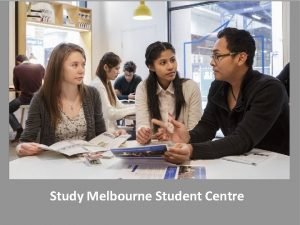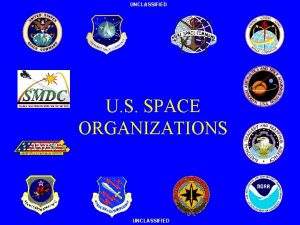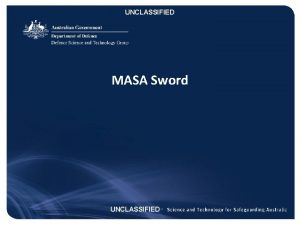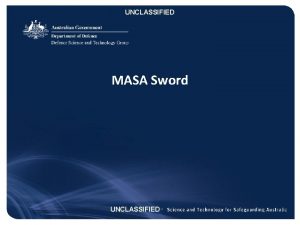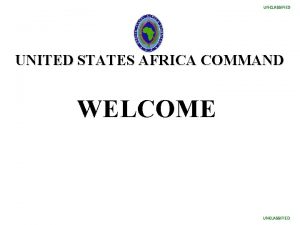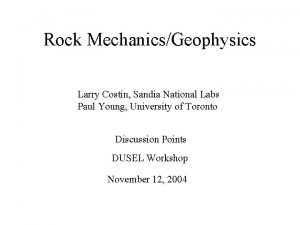Sandia National Labs approved for unclassified unlimited release

Sandia National Labs approved for unclassified unlimited release SAND 2018 -6735 PE Not supported by government funds A Role for IEEE in Quantum Computing Erik P. De. Benedictis, 1 Travis S. Humble 2 1 Center for Computing Research, Sandia 2 Oak Ridge National Lab Rebooting Computing IEEE Session June 21, 2018 Additional team members (not all have acknowledged this document): Tom Conte, Paolo Gargini, D. Scott Holmes, Garrett Kenyon, Bruce Kraemer, Oleg Mukhanov, Andrew Sornborg, Terence Martinez, Bill Tonti, Elie Track, whurley, Stan Williams 1

Overview • The time is right for IEEE to engage in quantum computing – There is “upside potential” for both computer engineering and algorithms, but no technology is so good it can’t be overhyped – World need methods for assessing the opportunity and orchestrating progress • We propose IEEE assert leadership in quantum computing – Proposed role is to establish and manage conferences, support publication of peer-reviewed papers, educate the community, develop standards, roadmaps, and certification methods • Proposal in the works for a summit meeting in September – – Create a vision statement for how IEEE could engage the area Propose a sub-agenda for Rebooting Computing week 2018 Create a CFP for a special issue of a CSC journal (more at end of slide deck) 2

Outline • • IEEE Activities Three Minute Tutorial: “Now You Know Quantum Computing” Strawman of a Role for IEEE Call to Action 3

IEEE Organizations Interested in Quantum Information • Future Directions Committee – Supports Rebooting Computing and this effort • Council for Superconductivity – Supporting this effort • Rebooting Computing – Comprising International Conference on Rebooting Computing, Industry Summit, and some support of the International Roadmap on Devices and Systems • IEEE-SA – IEEE Standards Association has three standards under development • Com. Soc – http: //qcit. committees. comsoc. org • IRDS – The semiconductor roadmap now has superconductor quantum information • If we left you off, let us know 4

Rebooting Computing Week 2018 • Peer-reviewed paper track on quantum computing • “Industry summit” currently has presentations by several top companies contributing to QC research • We’re working on a competition or Quantum TOP 500 list 5

IRDS Superconducting and Quantum Computing Information type Quantum Exotic systems: Research tools, standards, sensors Quantum Artificial Intelligence Quantum computers its ub ic Q n e ge or o : M ry ol c th r g & nt pa tal win co up gi ro e di t g al og- a Sc al ms d ion An ste an icat sy ale ist sc ph so Agenda • Part of Beyond CMOS in 2017 • Separate chapter 2018 onward Topics • Superconductor electronics • Cryogenic electronics • Quantum computing • Quantum sensors • Applications Derived from • USA 4 SCE JJ workshop, 2017 Visual depiction Classical Overview Today: Superconductor electronics, sensors, qubits, and standards Specialized Energyefficient data centers Market size Large See https: //irds. ieee. org/roadmap-2017 and https: //irds. ieee. org/images/files/pdf/2017/1523037982875 -IRDS_Cryo. E_Holmes. De. Benedictis_v 4 b. pdf 6

IEEE Standards Association P 7130 (Q. Definitions) P 7131 (Q. Metrics) The purpose of this project is to provide a general nomenclature for Quantum Computing that may be used to standardize communication with related hardware, and software projects The purpose of this project is to provide a standardized set of performance metrics and a standardized methodology of benchmarking the speed/performance of various types of quantum computing hardware and software as well as comparing these performance metrics to identical metrics in classical computers such that users of this document may determine the speed of a quantum computer for a specific application can easily, and reliably, compare computer performance P 1913 (Q. Comms) Define a classical interface to quantum communication devices that permits these devices to be reconfigured to implement a variety of protocols and measurements. • • • For standards 7130 and 7131, see Webinar https: //www. youtube. com/watch? v=q. Kt 7 d. Of 4 p. XY&feature=youtu. be For standard 1913 see CFP http: //globecom 2018. ieee-globecom. org/workshop/ws-19 -qcit-quantum-communications -and-information-technology/call-papers There may be others … there is no unambiguous dividing line identifying quantum standards 7

Council on Superconductivity Support • CSC has offered support to quantum computing and support technologies, to the extent they are based on superconductivity Special issue • CSC has offered a special issue on quantum computing 8

IEEE-Com. Soc QCIT Quantum Computing and Information Technology E-mail Sent May 14 • Called “Interdisciplinary Technical Committee on Quantum Communications and Information Technology” (QCIT) • Emerging Technology Initiative under IEEE COMSOC • Regular meetings at Globecomm and IEEE ICC • Travis Humble is a member From: Peter Mueller [mailto: pmu@zurich. ibm. com] Sent: Monday, May 14, 2018 4: 28 PM To: IEEE-New-TC-on-Quantum@mx 0 a-001 b 2 d 01. pphosted. com Subject: Introducing new IEEE Technical Committee on Quantum Communications and Information Technologies Dear Author, we hope this email finds you well. You are recognized as an author publishing in a field which is related to quantum technologies. Therefore, you may be interested in our newly established interdisciplinary Technical Committee on Quantum Communications and Information Technology (QCIT), which is part of IEEE Comsoc. To join the committee, please send an email to list@comsoc. org using your preferred email account. In the body of your message, type "JOIN QCIT" to subscribe the QCIT list. If you do not receive a registration reply, then please let me know. The QCIT list is a members list which distributes a few mails per year only. The committee maintains a second list dedicated for the distribution of messages. Further information about the QCIT, its activities and mail lists can be found under: http: //qcit. committees. comsoc. org/ If you have questions regarding QCIT, please do not hesitate to get in contact with us. With best regards, Lajos Hanzo, Peter Mueller, Andrea Conti 9

Outline • • IEEE Activities Three Minute Tutorial: “Now You Know Quantum Computing” Strawman of a Role for IEEE Call to Action 10

Three Minute Tutorial: “Now You Know Quantum Computing” • Authored by whurley, lead of two IEEE-SA activities – https: //www. youtube. com/watch? v=0 l. Zhg. Fm. M 9 AE 11

Outline • • IEEE Activities Three Minute Tutorial: “Now You Know Quantum Computing” Strawman of a Role for IEEE Call to Action 12

A Strawman Role for IEEE Useful quantum algorithms found IEEE is a prominent stakeholder in a pending broad base technology that will impact basic functionality for computing Many Great potential but not implementable (Ga. As semiconductors) Server farms of quantum computers feasible and useful (Quantum Moore’s Law) IEEE’s Proposed Role: The future of quantum computing lies somewhere on this chart. IEEE will help find exactly where Few Theory without practical application (physics education, chemical bonds) Few qubits; short lifetime Exquisitely engineered quantum computer with limited applicability (LIGO gravity wave detector) Scales Technology for building a quantum computer at scale 13

Quantum Speedup I • Qubits are “probabilistic bits”* – But if the probabilities are all 0% or 100%, the quantum computer is just a classical computer – If the probabilities include values between 0% and 100%, the computer may exhibit unique quantum behavior • A classical computer can simulate probabilities with floating point numbers, but there can be up to 2 N such probabilities for N qubits • In some cases, a single quantum computer operation on N qubits is equivalent to 2 N operations on bits. • Quantum speedup is Tc/Tq, or – the classical computer’s time for an algorithm Tc divided by – the quantum computer's time for the algorithms Tq • This can create an exponential quantum speedup – This leads to current discussion of quantum supremacy *Qubits are “probabilistic bits” but have some other properties beyond the scope of this slide deck. 14

Quantum Speedup II • Large quantum speedups – Exponential for some chemistry problems. Example Tc/Tq = 2 N – Subexponential for factoring integers. Example Tc/Tq = 2 N • Limited algorithm class – There are fast and slow algorithms for both classical and quantum computers – For a quantum computer to have an advantage, we need the algorithms to be faster with probabilistic bits? – Not many are known • Question: What determines whether an algorithm benefits from probabilistic bits, or qubits? • Your answer: __________. • My response to your answer: “Me neither. ” 15

Quantum Speedup III • Computer programming languages have been important to society – What would happen if you asked a monkey what he thought about C++17? – Nothing. A monkey’s brain is not capable of the linguistic processing necessary to understand English, C++17, or abstract concept of a language definition • Place value number systems are regarded as a technological breakthrough – What would happen if you suggested a cave man/woman use a spreadsheet to assess the efficiency of his/her hunting business? – Nothing. An understanding of place value numbers is necessary to understand spreadsheets and efficiency • What if you ask complexity theorist how many high speedup quantum algorithms exist? – They tell you there a few that are obviously useful, but many others where they can’t see the utility – But maybe if we had quantum computers, the new things they do would advance civilization to the next level – just like language and numbers 16

How many useful quantum algorithms will be found? A Strawman Role for IEEE Great potential but not implementable (Ga. As semiconductors) Server farms of quantum computers feasible and useful (Quantum Moore’s Law) IEEE’s Proposed Role: The future of quantum computing lies somewhere on this chart. IEEE will help find exactly where Theory without practical application (physics education, chemical bonds) Exquisitely engineered quantum computer with limited applicability (LIGO gravity wave detector) 17

Quantum Engineering I • Qubits require exquisite technology – “Quantum” refers to a single unit, typically storing information in a single particle – Another single particle in the wrong place due to material imperfection cause a qubit to behave differently – and the situation cannot be fixed in increasing the “signal to noise ratio” because the signal would become multiple particles • The quality of a qubit is measured by – Coherence time, or the average number of nano- or microseconds before a qubit changes state due to imperfections. Useful for memory. – For logic, the relevant metric is the average number of quantum operations that can be performed in a time interval equal to the coherence time. 18

Quantum Engineering II • Quantum technology has gotten better – Wineland et. al. got a Nobel Prize in 2012 with an Ion trap quantum computer which could do about 100 quantum operations before decohering – Today’s quantum computers are 49 to 70+ qubits, with similar reliability • Quantum error correction can help – There is a well-established theory that multiple “physical” qubits can be used to represent one “logical” qubit, similarly to multiple bits being used to represent a single bit in communications or a memory – The quantum error correcting code must apply to operations as well as static data, which is a complication but has been addressed • However, we’re barely ready for quantum error correction – Below an error threshold, errors accumulate faster than they can be removed. Currently technology is about at the threshold (which is why there's a fuss). – Furthermore, quantum error correction increases the number of qubits needed to solve a problem. If it takes 7 physical qubits to create one error corrected qubit, a 49 qubit quantum computer has only 7 logical qubits available to solve a problem 19

Quantum Engineering III • Metrics are an important topic – IEEE-SA P 7131 is a standards effort to define a quantum metric • IBM proposed a metric called “quantum volume”: – Assume N qubits are laid out in a structure, like a 2 D mesh – Move two arbitrary qubits so they are adjacent via qubit swaps – Perform an arbitrary 2 -qubit quantum operation on the qubits – Use a process where an any quantum operation can be performed through a sequence of just a few operations, to some accuracy • Metric is product of #qubits × #operations before decoherence Q 1 Q 2 Q 3 Q 1 Q 3 Q 2 Q_ Q_ Qn Q_ Q_ Qn A B A Q 1 Q 2 Q 3 Q_ Q_ Qn Q_ Q_ Qn 20

A Strawman Role for IEEE Great potential but not implementable (Ga. As semiconductors) Server farms of quantum computers feasible and useful (Quantum Moore’s Law) IEEE’s Proposed Role: The future of quantum computing lies somewhere on this chart. IEEE will help find exactly where Theory without practical application (physics education, chemical bonds) Exquisitely engineered quantum computer with limited applicability (LIGO gravity wave detector) How far will quantum information technology scale? 21

Outline • • IEEE Activities Three Minute Tutorial: “Now You Know Quantum Computing” Strawman of a Role for IEEE Call to Action 22

Status of Proposal Draft September summit Summit work product • One full-day meeting • ~20 people, comprising experts, stakeholders, IEEE staff • Moderated? • Question: “how should IEEE engage the field of quantum computing? ” • Vision statement on IEEE’s role in quantum computing • A sub agenda for ICRC 2018. The industry summit will have key players present • A CFP for CSC’s special issue • A second draft of the roadmap plan • Steering committee identified • A prize or rating plan • Other items TBD • Funding request – FDC, CSC 23

Questions for Group Today Scope What to do at ICRC? • Quantum computing or quantum information? • Do we act or wait until we have the perfect course of action? • Example: Assess progress? • Quantum information = quantum computing + quantum communications + quantum sensors • Quantum computers = 99% classical control + 1% quantum gates and qubits – Option 1: Vendors are touting progress in reaching more and more functionality. Could we issue an assessment in November using available metrics. Like Gordon Bell award in supercomputers. – Option 2. Delay a couple years until there are established quantum benchmarks, like Linpack for TOP 500 list. 24

Questions for Group Today Part of RC or Separate What does IEEE Need? • Should a quantum computing effort be part of RC or a separate initiative? • I don’t represent IEEE, but a lot of organizations like IEEE are developing positions on quantum computing/information • IEEE is a professional organization, and hence a bit different from the others • What does IEEE want? 25
- Slides: 25
